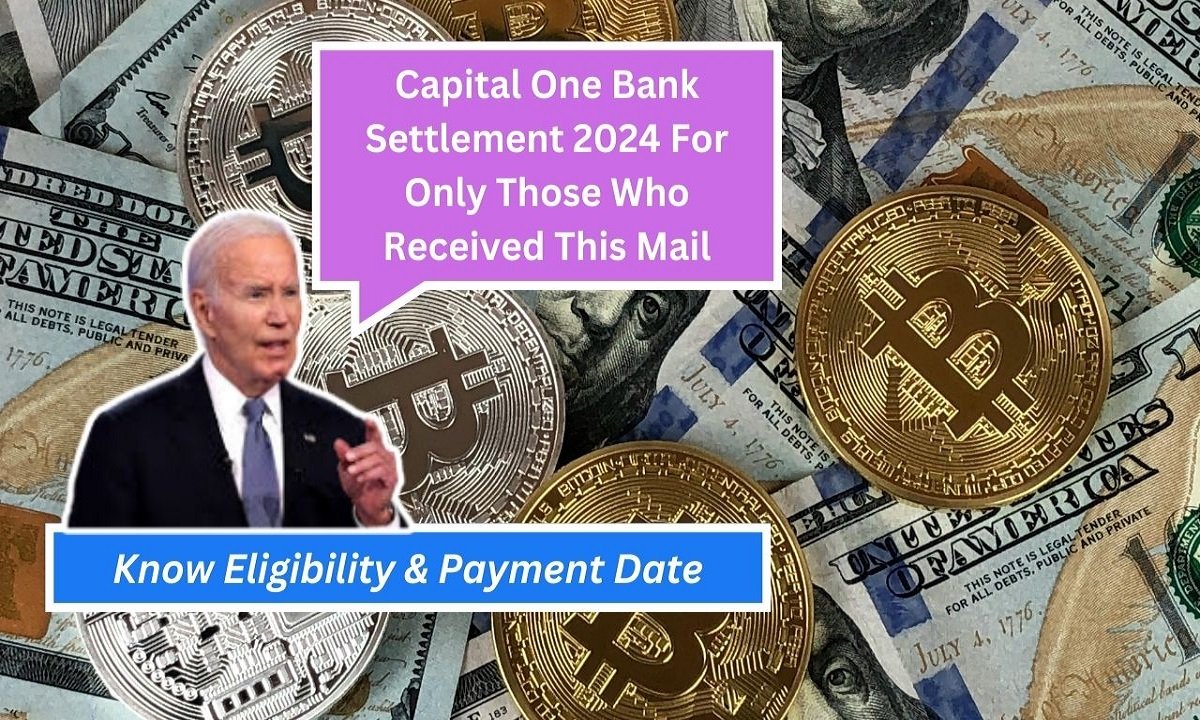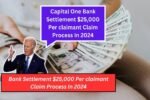If you’ve recently received a notice about a Capital One bank settlement, you might be wondering what it’s all about and, most importantly, if you’re eligible to receive any payout. Settlements can feel confusing, especially when they show up unexpectedly in your mailbox. But don’t worry; this guide will help clarify what this settlement means, who qualifies for it, and when you might expect a payment.
What Is the Capital One Bank Settlement?
The Capital One settlement in 2024 is part of a legal agreement reached after a class-action lawsuit. This suit was filed by individuals who claimed that Capital One mishandled certain accounts, leading to extra fees, inaccurate information, or even privacy violations. To resolve these claims, Capital One has agreed to a settlement that includes compensating eligible customers. Settlements like these aim to make up for any damages caused by the bank’s actions without going through a lengthy court battle.
Why Did You Receive a Notice?
Receiving a notice usually means that you’ve been identified as a potential member of the class-action settlement. In this case, Capital One likely had records of your account, which met certain criteria outlined in the lawsuit. The notice explains your eligibility and outlines what steps, if any, you need to take to participate. It’s always a good idea to read through such notices carefully. They contain essential information on what you might need to do next.
How Do You Know if You’re Eligible?
Not everyone is eligible for this settlement, as it only applies to a specific group of people affected by Capital One’s practices during a certain period. Generally, eligibility criteria are outlined in the notice you received, but here’s a quick look at what often qualifies someone:
- Account Activity: You had certain accounts with Capital One that were affected by the practices in question. This could mean specific types of charges, account handling errors, or data-related issues.
- Time Period: The issue had to have occurred within a specified time range, as mentioned in the notice.
- Direct Impact: Typically, only those who were directly impacted by the alleged actions will qualify for a payout. In other words, if Capital One’s practices didn’t affect your account, you probably won’t be eligible.
If you’re still uncertain about your eligibility, check with the settlement administrator listed in the notice. They can confirm if you’re part of the settlement class.
How Much Could You Receive?
The exact amount each eligible customer will receive isn’t always clear upfront. Settlements like this one usually involve a set total fund, which will be divided among those who qualify. The final payment per person depends on factors like the number of people involved and the specific impact on each customer.
For instance, if there are thousands of eligible customers, the payment per person might be smaller. However, if fewer people qualify, individual payments could be higher. You might also see different levels of compensation, depending on the severity of the issue with your account.
Do You Need to File a Claim?
In some cases, claimants don’t need to do anything to receive their payment if they’re already on file. Other times, there’s a requirement to file a claim form. Check your notice carefully for any instructions on filing. If you need to fill out a claim, follow the steps provided. Many settlements now allow for online claim submissions, making it easier and quicker to get the process started.
Make sure you submit any required forms before the specified deadline. Missing this deadline could result in losing your eligibility for payment, so it’s best to act sooner rather than later.
When Can You Expect Payment?
Waiting for a payout can test your patience. Settlements usually require a few months to finalize, as the court must approve the terms and process all eligible claims. Once everything is approved, payments will typically be distributed as soon as possible.
The notice you received should provide an estimated timeline, but remember that delays can happen. It’s always a good idea to keep the notice handy and check any updates from the settlement administrator. Some settlements even set up a website where you can track updates on the process and payout dates.
What to Do if You Have Questions?
If you’re still unsure about something, don’t hesitate to reach out. Many settlement administrators provide a helpline or email address in the notice. They’re there to answer questions about the settlement, the claims process, and anything else you might need to clarify.
It’s also helpful to double-check any details that seem confusing or vague. Scammers sometimes try to take advantage of situations like these by sending fake notices or asking for personal information. If anything feels off, call the official settlement helpline to verify.
Conclusion
Receiving a settlement notice can be surprising, but it might be an opportunity for compensation if you’ve been affected by Capital One’s practices. Review your notice carefully to understand your eligibility, follow any steps required to submit a claim, and keep an eye on payment dates. Settlements are designed to resolve disputes fairly, giving you some restitution for any inconvenience caused.
FAQs
What is the Capital One settlement about?
It’s a legal agreement to resolve claims related to Capital One’s handling of certain accounts, involving issues like fees, account errors, or privacy concerns.
How do I know if I’m eligible for a payment?
If you received a notice, you’re likely identified as eligible. Check the specific criteria mentioned in the notice for confirmation.
Do I have to submit a claim to receive my payment?
This varies; the notice will state if a claim form is needed. Some customers are automatically eligible, while others may need to file.
When can I expect the payout?
Payments usually take a few months after final approval. Check your notice for estimated timelines, but delays can happen.
Who can I contact for more information?
The settlement administrator’s contact details are in the notice. They can help with eligibility, filing questions, and updates.






